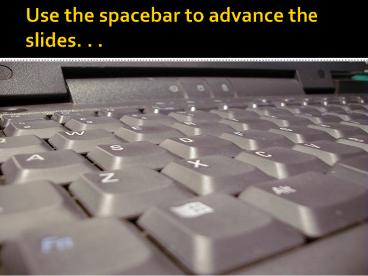Use the spacebar to advance the slides. . . - PowerPoint PPT Presentation
1 / 27
Title: Use the spacebar to advance the slides. . .
1
Use the spacebar to advance the slides. . .
2
To begin, click below. . .
3
To begin, click below. . .
4
To begin, click below. . .
5
Academic Integrity
- Distance Learning Environments
6
Integrity
- Definition
- Motivating Factors
- Grades vs. Learning
- Expectations of Institutions and Faculty
7
Defining Integrity
- Adherence to moral and ethical principles,
soundness of moral character honesty - Quality or state of being of sound principle
uprightness, honesty, and sincerity - Pursuit of scholarly activity in an honest and
responsible manner
8
Teaching Integrity
- 97 of students informed
- 21 understand
- Of these, 67 gained understanding from faculty
- Of these, 21 gained understanding during first
semester orientation - 30 believe penalty is severe
- 11 believe effective
9
Online vs. F2F
- Cheating holds across all modalities
- Reasons for cheating mostly the same
- Possibly LESS cheating online
- Student centered, interactive course design
significantly reduces cheating
10
Motivating Factors
- Pressure to get good grades
- Lack of preparedness
- Challenge/thrill
11
Who cheats?
- Males more likely
- Students active in extracurricular activities
- Inferior students
- Unmotivated students
- Unchallenged students
- Peer groups
12
Reasons for cheating
- Time
- Assignment is a waste of time
- Student doesnt have enough time
- Student poorly manages time
- Ethics/Societal
- Cheating is accepted
- Confusion about educational goals
- Knowledge and education as a commodity
- Faculty reluctance to enforce penalties
13
Reasons, cont.
- Survival
- Scholarship and job opportunities
- Everyone else is doing it
- Knowledge
- Lack of skills
- Research
- Citation
- Understanding assignment
- Self-doubt
14
Reasons, cont.
- Ease
- Personal
- Laziness
- Thrill seeking
- Simply hate tests
15
Superior Grades
- Do superior grades indicate superior learning?
- Do superior grades contribute to acceptance at
other schools?
16
Choose Learning vs. Grades
- Measureable objectives
- Assessments aligned with objectives
- Summative
- End of course
- Tied to grading
- Evaluative
- Formative
- Throughout course
- Aids learning
- Not tied to grading
- Diagnostic
17
Assessments
- Formative vs. Summative
- Which appears superior for best learning?
- Is the goal to assign grades or promote learning?
- Which would most likely realign student
perception from grades to learning? - Could use of formative assessments reduce
cheating?
18
Example READ!
- Weekly open book, MC/TF quizzes
- Encourage use of book/reading
- Fear factor reduced multiple attempts
- Motivation to cheat reduced
- Repetition improves retention
- End of semester exams based on quizzes indicate
retention
19
Example Hands On
- Weekly hands on assignments
- Multiple attempts, open resources
- Encourage analysis, evaluation, critical thinking
- Fear factor reduced
- Motivation to cheat reduced
- Demonstrate mastery of skill
- Cumulative assignments reinforcing prior learning
- End of semester project demonstrates mastery of
course objectives
20
Digital Submissions
- Document
- File ownership
- Creation/modification dates
- Indicate duplication
- Screening using applications
- IP addresses
21
SACS Expectations
- Institution must demonstrate that the student who
registers is the same student doing the work and
receiving the grade/credit - Acceptable verification
- Secure login and pass code
- Proctored exams
- New/other technologies (cameras, software, etc.)
22
SACS Best Practice
- The importance of appropriate interaction
between instructor and students and among
students is reflected in the design of the
program and its courses. . .
23
US Department of Education
- Secretary of Education seeks to improve integrity
- NPRMs under Administrative Procedure Act
- Student identification changed to identity
- Commenters suggest means beyond those currently
approved (login and pass code) - Congress conference report continued use of PINs
and passwords is consistent with both the
statutory language and the intent of the
Congress. (2010)
24
Conclusion
- Students cheat
- Faculty CAN effect change using learning centered
tools - Course development, design, and structure
- Learning centered assessments
- Adequate communication of expectations, position,
and penalties for cheating - Seek innovative alternatives to ensure integrity
25
By students for students
26
References
- For reference list contact Susan Booth at
sbooth_at_cfcc.edu
27
Contact Information
- Susan Booth
- Faculty, Cape Fear Community College
- Business Technologies Department
- 4500 Blue Clay Road
- Castle Hayne, NC 28429
- 910.362.7450
- sbooth_at_cfcc.edu































